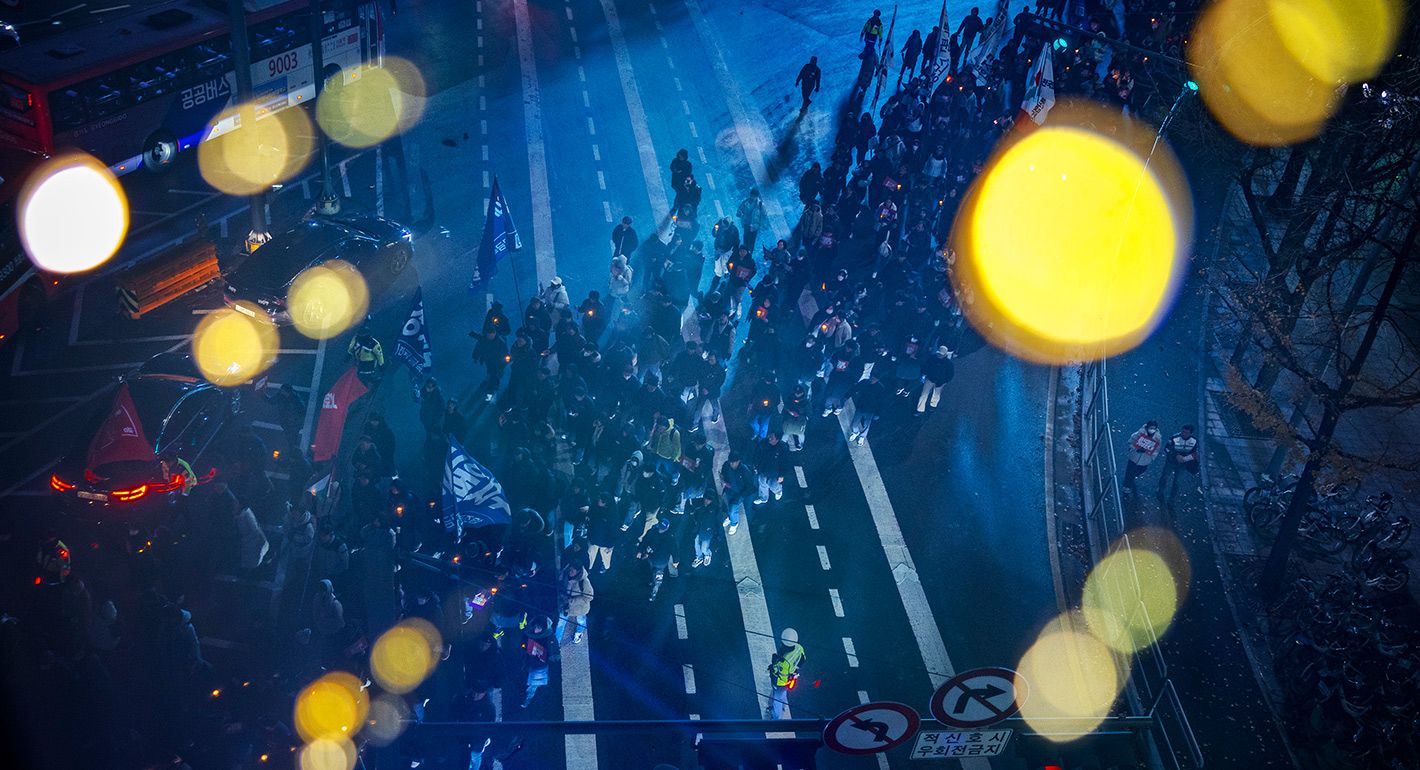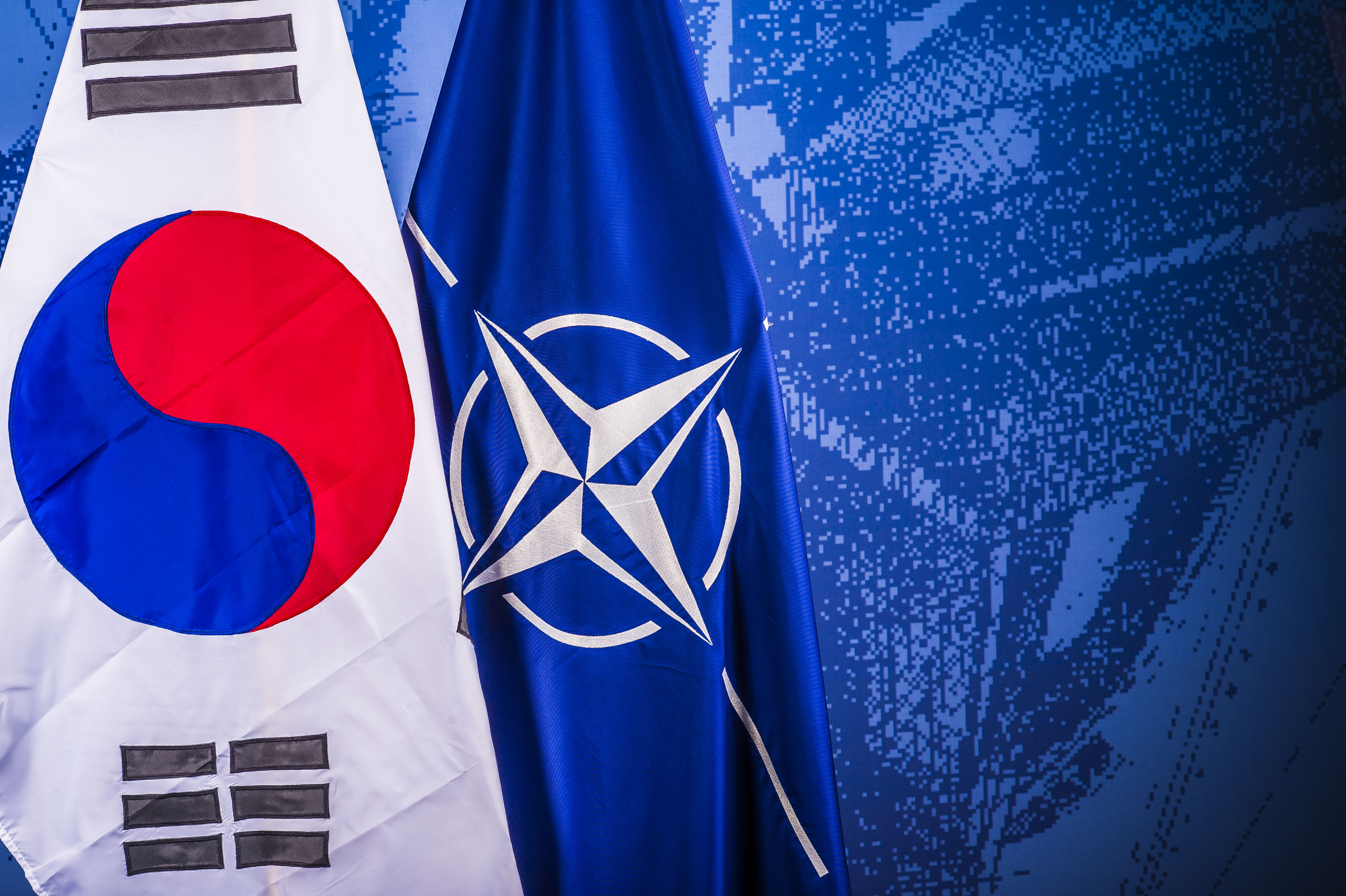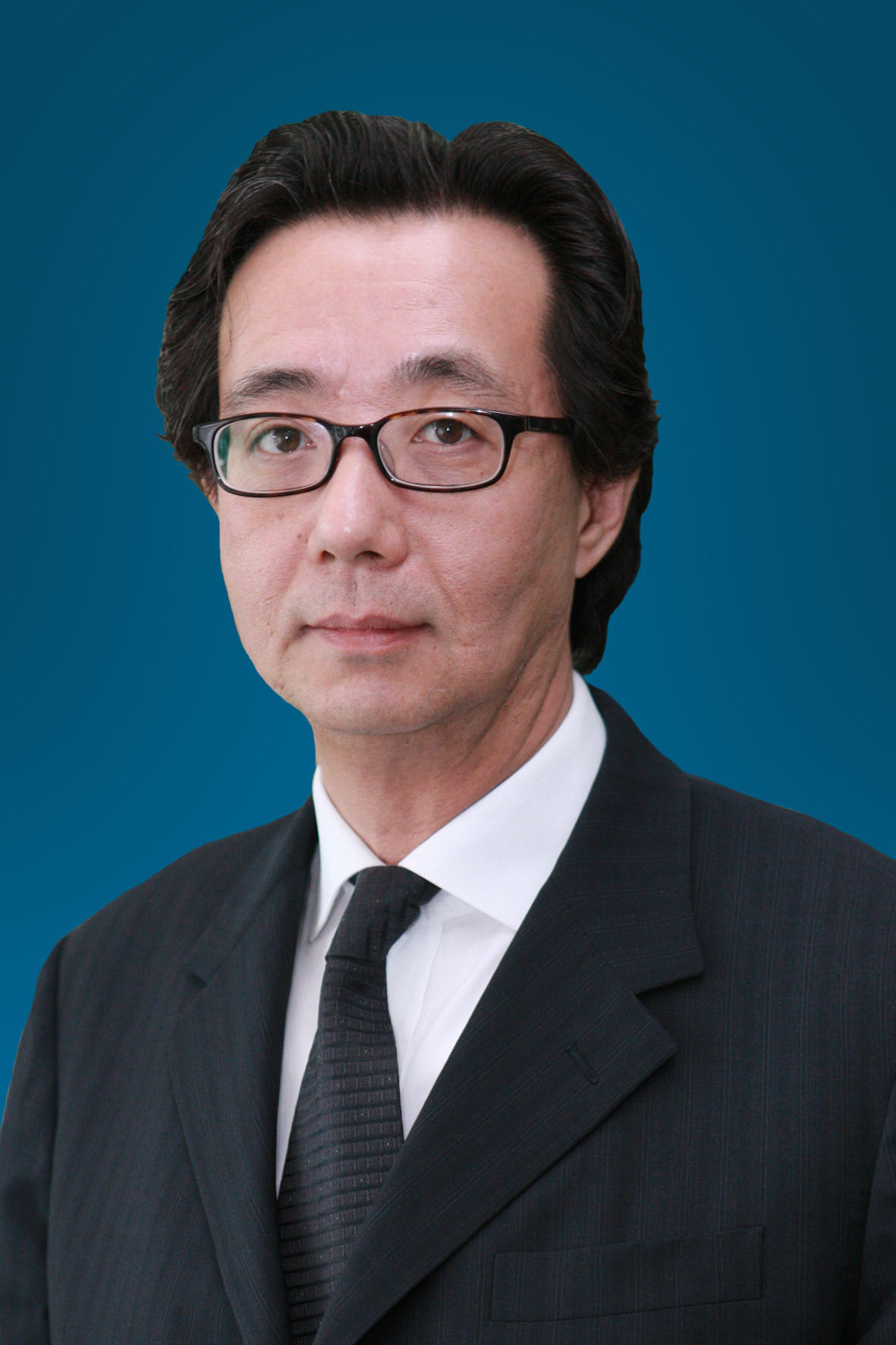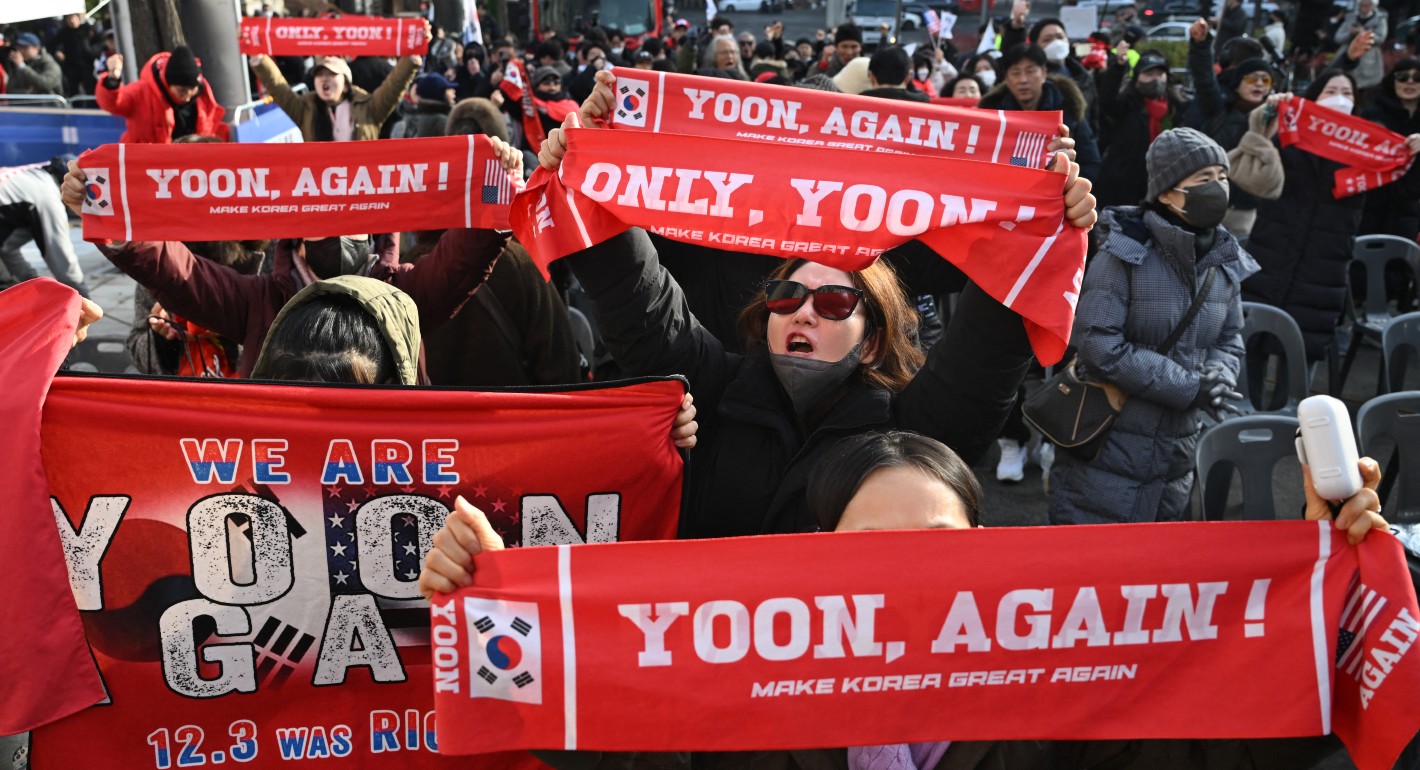At 10:23 p.m. local time on December 3, 2024, South Korean President Yoon Suk-yeol declared martial law. As Koreans across the nation sat glued to their TVs—shocked and stupefied—the opposition liberal party, the Democratic Party (DP), denounced Yoon’s move. And the leader of Yoon’s conservative ruling People Power Party (PPP), Han Dong-hoon, immediately attacked Yoon’s decision and said he would stop it “together with fellow Koreans” around 10:45 p.m., when no one really knew what was going on. As troops summoned under martial law began to surround the National Assembly building, citizens began to gather, and many wondered if clashes were inevitable.
Within two and a half hours, however, the 190 out of 300 members of the National Assembly who were present at the time voted unanimously to annul martial law, a decision that Yoon had to accept. According to local press reports, the majority of the cabinet who reviewed Yoon’s decision to enact martial law were opposed, but he steamrolled his decision. (The cabinet does not have the power to approve or disapprove the enactment of martial law.) The Chosun Ilbo, a widely read South Korean newspaper of record, reported on December 4 that all cabinet members (including the prime minister) tendered their resignations, although the final decision will be made by Yoon.
In the past, specific cabinet members or the entire cabinet resigned to accept responsibility for a particular crisis. Demonstrating collective responsibility is an important element of the Korean political milieu. The same newspaper article noted that, in addition to the cabinet, the president’s chief of staff, director of policy, and the national security adviser also offered to resign from their posts. The silver lining in the midst of an explosive political crisis is that South Korea’s constitution was upheld.
Yoon should never have chosen to announce martial law, but he did so at the most precarious moment of his presidency and amid mounting external challenges. It will take several weeks and months before the dust settles, but three key consequences are most likely.
- A rapid erosion in Yoon’s remaining authority and influence as president, just at the midpoint of his single five-year term, and a growing possibility of his resignation, because his political support is cratering not only within the ruling party, but across the country
- Massive political struggles and realignments within the ruling and opposition parties to maximize political dividends, as presidential hopefuls begin to flex their muscles in earnest in early 2025, with the possibility of early elections if Yoon is ultimately impeached or chooses to step down
- Significant external ramifications of a weakened South Korean government just as Donald Trump prepares to re-enter the White House in January 2025, North Korea’s nuclear threat worsens, more North Korean soldiers join the fight alongside Russia in the Ukrainian war, and the potential for worsening U.S.-China trade wars that will have critical ramifications for the South Korean economy
Yoon’s Crashing Support Base
Whatever happens in the ensuing weeks and months, South Korean democracy is going to remain intact. But for all intents and purposes, Yoon’s authority as president has eroded to the point of no return. The DP and other opposition parties submitted an impeachment motion in the National Assembly charging Yoon with sedition, and voting is scheduled for December 7 (although PPP members have stated that they will oppose impeachment).
In a development that illustrated the extremely fast-paced tempo of this crisis, on December 5, the National Assembly passed a motion impeaching the auditor general and three high-ranking prosecutors, including an official who allegedly failed to fully investigate a stock manipulation case against First Lady Kim Keon-hee. Out of 192 members seated in the National Assembly, the motion to impeach the auditor general passed with 188 in favor and four against. This was the first time in South Korean political history that the auditor general was impeached. One of the main reasons behind Yoon’s very low approval rating even before the martial law fiasco was his refusal to allow the prosecution to investigate many scandals associated with his wife. In October 2024, The Diplomat noted in an article that:
“Yoon’s once-stalwart image as an uncompromising prosecutor who led heavy-handed investigations into political and business elites is nowhere to be seen today. When the charges of misconduct implicate his family, the president apparently operates with a different yardstick. This was evident when Yoon twice vetoed (recently in October) a bill seeking a special counsel inquiry into allegations against Kim, despite overwhelming public support for such an investigation.”
When he won the presidency in March 2022 with a margin of just 0.7 percent, Yoon promised to run a more open government. He vowed to correct what he felt were shortcomings of the previous progressive administration led by former president Moon Jae-in. Yoon moved quickly to strengthen South Korea’s critical alliance with the United States and improve South Korean–Japanese ties despite political blowback at home. Yoon also dismantled Moon’s non-nuclear energy policy and enacted much stronger responses to North Korea’s continuing nuclear weapons program. From the onset of his presidency, he highlighted the importance of freedom, democracy, and human rights and became the first South Korean president to enact North Korean Defectors’ Day on July 14, 2024, to accentuate the abysmal human rights abuse in North Korea.
But Yoon failed to connect with ordinary Koreans and, contrary to his initial pledge, did not hold regular press conferences. His approval rating for the past two and a half years rarely went above 20 percent—an historical low for South Korean presidents since the restoration of democracy in 1987. Although his approval rating is likely to tank after the martial law fiasco, Yoon’s approval rate in a Gallup Korea poll released on November 1, 2024, already stood at a dismal 19 percent. He had little time or patience to listen to contrasting views, and his abiding political mindset was “my way or the highway.”
According to Yoon, it was necessary to declare martial law to remove pro-communist forces and to maintain constitutional law and order. He argued that the DP’s incessant opposition—such as countering his bills and policies, introducing multiple bills to impeach prosecutors who brought criminal charges against DP President Lee Jae-myung, and supporting efforts to impeach the Auditor General, a constitutionally mandated post—made it impossible to enact his duties as president.
Nevertheless, there is no public support for Yoon’s misguided martial law fiasco even though many also believe that the DP shares responsibility for the dismal state of South Korean politics. Even without the martial law disaster, Yoon’s political capital going into 2025 was going to be diluted as presidential nominee hopefuls in his ruling PPP were planning to flex their muscles. The division within the ruling conservative party is going to become even more pronounced as the majority pro-Yoon faction among the 108 members of the PPP will find it impossible to defend the president’s actions. Key figures, such as party leader Han and Seoul Mayor Oh Se-hoon, will jockey for power within the ruling party: In fact, Han has called on Yoon to remove himself from the PPP in an ongoing effort to distance himself and the ruling party from Yoon. In a meeting with ruling party leaders on December 4, Han stated that “the decision to ask President Yoon to resign from the party was taken by the party’s leadership conference and I transmitted the party’s decision to Prime Minister Han and Presidential Chief of Staff Jeong Jin-seok during today’s meeting in the prime minister’s residence.”
Regardless of whether the prime minister, the cabinet, and other high-level officials resign, it will not stem the loss of blood in the Yoon government. And even if the impeachment motion does not pass, it does not mean that Yoon’s ability to stay in office is going to improve. Indeed, regardless of the impeachment outcome, calls for his resignation are going to increase across the political spectrum, and the bureaucracy will wait on the sidelines.
The Race to Succeed Yoon
South Korean politics has always hovered around strong personalities rather than sturdy political parties built around contending factions. Yoon was not an exception, and neither is the DP president, Lee. Given his unwillingness to listen to contending views, Yoon is highly unlikely to resign from the presidency, and Lee will continue his battle to oust the president by all possible means. Although Yoon is facing an existential crisis, Lee is far from hitting multiple home runs. The combined opposition hold some 187 seats, led by the DP with 170 seats, while the PPP has 108 seats. Three political issues are going to remain at the top of the agenda.
First, how many members of the PPP will end up supporting Yoon’s impeachment? According to the constitution, a president can be impeached if two-thirds of the National Assembly members (or 225 votes out of 300) vote in the affirmative. Then the Constitutional Court deliberates on the merits of the case, and at least six justices must vote to impeach the president. While there are nine seats in the Constitutional Court, three remain vacant at the moment, which means that if an impeachment hearing reaches the court, there must be a unanimous decision by the justices to impeach Yoon.
As mentioned above, while an impeachment vote is scheduled to take place on December 7, the PPP has stated that they will oppose the impeachment motion. If the impeachment vote fails in the National Assembly, the combined opposition parties are likely to resubmit another impeachment motion over the next several weeks, although the PPP will continue to resist supporting Yoon’s impeachment. The reason why the PPP remains against impeachment is the trauma that continues to linger within the party from late 2016, when enough members voted with the opposition party to impeach former president Park Geun-hye. In March 2017, Park’s impeachment was finalized by the Constitutional Court, and she resigned immediately from the presidency.
While the cases are different because Park never declared martial law, it remains uncertain whether the public will support another impeachment. But the net result is that at a minimum, throughout the first half of 2025, South Korean politics will be engulfed by the aftershocks of Yoon’s martial law disaster. Moreover, the impeachment of the auditor general on December 5 suggests that some members of the PPP voted in favor of the motion, thus leaving open the possibility of additional voting defections from the PPP.
Second, as pressure mounts within the PPP to distance itself from Yoon, struggles between the pro- and anti-Yoon factions will intensify, and Han will double his efforts to strengthen his grip on the party at a time of peril and to make sure that the PPP remains intact despite internal tensions. At the same time, however, even though Yoon and the PPP face enormous pressures, Lee and the DP are not automatically going to regain the presidency. Lee currently faces at least four separate criminal charges related to corruption and other criminal activity, including from when he was the mayor of Seongnam City. These cases are meandering through the courts and Lee has vowed to wait until the supreme court reaches the final verdict, which will take time.
Third, for the conservatives, the challenge is going to be significantly more difficult than for the DP, because the PPP has to distance itself from Yoon as much as possible while resetting itself in order to nominate a viable presidential candidate in 2025. Although the next presidential election is scheduled to be held in March 2027, it is going to be extremely difficult for Yoon to finish his term due to mounting pressures to resign and to accept full responsibility for bulldozing through martial law when there was no apparent reason to do so. As a result, while it is theoretically possible for Yoon to remain in office, chances are very low.
The DP and party leader Lee are most likely preparing for Yoon to resign in order to maximize public discontent with the PPP, and for now, there is no one within the DP to challenge Lee’s leadership. Hence, Lee’s chances of winning the next presidential election are higher than ever before, although he also faces numerous hurdles. In the end, the vicious cycle of retributions, which have been an unfortunate hallmark of South Korean politics, is not likely to stop when this current crisis ebbs and a new president takes office. And such a development will only deepen the huge and vicious political divide between the left and the right in Korean politics and society.
Rising External Threats and Challenges
South Korea’s martial law fiasco could not have come at worse time given the range of external threats facing the country. After Russian President Valdimir Putin and North Korean leader Kim Jong Un signed a new defense pact in June 2024, Kim opted to send between 11,000 and 12,000 North Korean soldiers to fight alongside Russian forces in the ongoing Ukraine war. The U.S. Department of Defense confirmed in early November 2024 that at least 10,000 North Korean troops were in Kursk Oblast. While accurate assessments of North Korean troop activities remain scarce, Ukrainian President Volodymr Zelensky stated in an interview with Kyodo News on December 1, 2024, that North Korean soldiers had died fighting for Russia, and he predicted that they would be ultimately used as “cannon fodder.”
Ever since the Ukrainian war began, the South Korean government has refused to send offensive weapons to Ukraine, because it is illegal under the country’s laws to transfer weapons to war zones. But Seoul has sent critical munitions and other war material to the United States and key NATO allies such as Poland that have, in turn, supplied weapons to Ukraine. South Korea provided about $400 million in humanitarian and financial aid to Ukraine in 2024. The Yoon government has come under increasing pressure from the United States and Ukraine to supply a range of weapons systems, including artillery and air defense systems that were requested by Ukraine. More importantly for South Korean security, Russia may feel obliged to transfer more modern weapons to North Korea, such as advanced combat jets and missile technologies. According to South Korean intelligence assessments as reported in The Guardian on November 22, 2024, “Russia has sent air defence missiles and other military technology to North Korea in return for the deployment of troops from the North to support the Kremlin’s war in Ukraine.”
Throughout 2024, North Korea hyped the possibility of war on the Korean Peninsula, and Kim Jong Un also declared the South as North Korea’s primary enemy and excluded all possibility of unification. Kim also stated on numerous occasions that North Korea would never give up its growing nuclear arsenal. In October 2024, Kim also threatened to use nuclear weapons to eliminate South Korea if North Korea was attacked. Kim stated that if North Korean sovereignty was encroached upon by the South, Pyongyang “would use without hesitation all the offensive forces it has possessed, including nuclear weapons . . . [and that] if such situation comes, the permanent existence of Seoul and the Republic of Korea would be impossible.”
As U.S. President-Elect Donald Trump prepares to re-enter the White House, he has threatened to raise tariffs on all imported goods from Canada, Mexico, and China with an extra 10 percent tariff on goods from China. One researcher contextualizes this, saying, “this is on top of earlier threats of imposing 60% tariffs on China and a blanket tariff of 10% to 20% on other imports to the U.S.—a protectionist plan that could reshape the U.S. economy in ways that have little recent precedent.” For a major trading power such as South Korea with critical economic ties to both the United States and China, if Trump goes through with his promises to start a new trade war with China, it is going to have significant repercussions for South Korean exports to China and future South Korean investments in the United States.
In late November 2024, five Chinese and six Russian military aircraft entered South Korea’s air defense identification zone (KADIZ); although this is not South Korean airspace, South Korean Air Force jets scrambled for contingency operations. Russian and Chinese intrusions into KADIZ have occurred since 2019. With these mounting threats and the international pressure South Korea faces from various angles, fractured politics at the top will only weaken the government’s ability to respond decisively and win public approval for its response to external challenges. In a country that already faces very harsh geopolitical and economic challenges, the current political crisis only dilutes South Korea’s ability to forge more resilient foreign policies and to mitigate outstanding national security threats.
Rough Waters Ahead but Maintaining Viable National Security
However the current crisis ultimately wraps up, Yoon no longer has leverage given the convergence of problems he faces at home and abroad and his vanishing political capital. South Koreans are rightfully proud of the enormous achievements the country has made over the past forty years. It is not only an advanced manufacturing and trading power but also one of the most vibrant democracies in Asia. By declaring martial law and then rescinding it after the National Assembly voted to annul, however, Yoon dialed back South Korea’s growing positive global brand and handed over the political initiative to the opposition. It is way too early to forecast where and how the chips will fall, but South Koreans should bet on the resilience of their core institutions, protecting their democratic rights and liberties, and ensuring that key national security postures remain even in the midst of a wrenching political crisis.
In the end, Yoon can only blame himself for getting cornered, and he had two and a half years to prove his governance skills. As South Koreans brace for additional perturbations down the road, they have to remind themselves that democracy is always a work in progress. Cooler heads are needed now more than ever to minimize the fallout from another existential political crisis.
Notes













